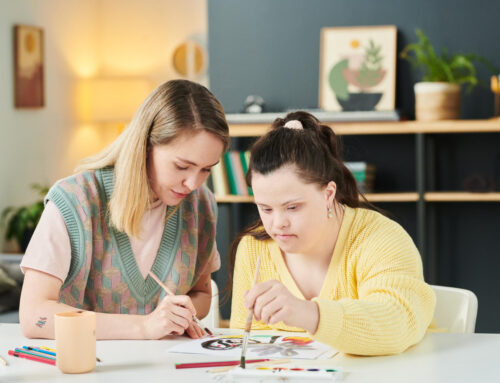Many are unaware of the field of occupational therapy & even fewer understand its importance in mental health. However, it is interesting to note that occupational therapy initially emerged in psychiatric hospitals, which is why it derives its name from the word “occupation.”
In the 1950s & 1960s, therapists in behavioral health would actively involve patients in meaningful activities, aiming to maintain their productivity, attention & overall well-being. The belief was that engaging in handiwork could significantly contribute to an individual’s recovery process.
This cncept still holds true today, as individuals often find more significant motivation for rehabilitation when they remain occupied & feel a sense of value & productivity. Naturally, their approach is now considered overly simplistic & outdated. The scope of their treatment merely involved engaging in activities like basket weaving, lacing & coloring, which is viewed as insufficient.
The reason we now distinguish between activities & occupations is because of the context of an occupational therapist’s role in mental health. The goal of occupational therapy is not just to provide patients with tasks to complete but rather to customize treatment based on their unique preferences, goals & needs across various areas. This approach ensures that therapy is tailored to individual requirements & promotes better outcomes.
For this very reason, mental health is considered one of the most adaptable practice areas in occupational therapy. Unlike therapists in skilled nursing facilities & hospitals, those working in mental health are not bound by rigid productivity standards.
This affords occupational therapists in mental health the freedom to employ ample creativity, planning & evaluation to gain a deep understanding of their patient’s needs & strive to fulfill them.
The Role Of OT In Mental Health

The responsibilities of a mental health occupational therapist may differ slightly between inpatient & outpatient settings. However, the objectives remain similar, with treatment aiming to enhance a patient’s understanding of their condition (referred to as insight) & broaden their repertoire of skills & resources for managing their disorder.
One of the primary methods utilized by occupational therapists in behavioral health settings is the implementation of psychoeducational groups. These groups primarily emphasize education, specifically tailored to the individual’s condition.
Unlike standard educational groups that simply present options in a particular area, psychoeducational groups demonstrate to patients how they can effectively engage in these areas despite symptoms, treatment plans & other factors.
Psychoeducational groups, whether in outpatient or inpatient settings, commonly cover a range of topics, including but not limited to:
- Instrumental Activities Of Daily Living (IADLs)
Instrumental Activities of Daily Living (IADLs) encompass a broad spectrum of topics that primarily focus on higher-level self-care tasks. These tasks include health maintenance (such as managing medications, appointments & treatment-related requirements), budgeting & household management, including laundry, driving & cooking.
Similar to self-care groups, approaching IADL groups also requires education that comprehensively covers the factors influencing IADL completion.
Depending on the facility’s regulations, funding & available treatment space, it may be necessary or suitable to practice these skills in either individual or group settings.
This approach allows for a comprehensive assessment of the patient’s safety, functionality & overall abilities in each respective area.
- Community Mobility Or Reentry
Depending on the context (inpatient or outpatient), education may include guidance on safely & effectively accessing the community or reintegrating into it after a hospital stay.
Some patients may benefit from learning how to use public transportation or ride-sharing services, reading maps, using medical transportation for appointments, utilizing online navigation systems, recognizing signage & locating essential community establishments like hospitals, stores & police stations.
Reentry groups can focus on teaching social etiquette in public settings, personal safety when interacting with others & navigating the community effectively.
- Individual Roles
Each individual has specific responsibilities to fulfill & mental health concerns can often hinder their ability to do so. It is essential to provide a comprehensive psychoeducational group that addresses various roles in a general sense, allowing each person to regain their engagement in meaningful roles that they prioritize.
These roles may include being a daughter or son, grandparent, parent, worker, church member, volunteer, or caregiver. Regardless, it is crucial to provide education on effectively managing their condition while still actively participating in these roles according to their preferences.
- Emotion Regulation
Covering a wide range of topics, from anger management to interpersonal dynamics to conflict resolution, this area provides valuable tools for addressing the uncomfortable feelings that often accompany mental health concerns.
It is essential to prioritize challenging emotions, such as abandonment, loneliness, fear of rejection & feelings of unworthiness. Additionally, this may encompass anger management, conflict resolution, interpersonal dynamics, social skills training & other related areas.
- Diagnosis Education
More provision of information regarding patients’ diagnosis or treatment plans is a common occurrence. Educating patients about the specifics of their conditions, including prognosis, treatment options recommended by their doctor, medications & supplementary treatments, is highly advantageous.
It is crucial to acknowledge that discussing an individual’s specific diagnosis or circumstances in a group setting violates HIPAA regulations. Therefore, if a patient requires or requests this type of education, it is best to provide it during one-on-one sessions.
- Social Skills & Communication
In addition to emotion regulation, social skills play a vital role in managing mental health conditions. Depending on the severity of an individual’s condition & their level of functioning, patients can benefit from education on appropriate social behavior.
This includes understanding verbal & non-verbal cues, being sensitive to specific topics, responding respectfully, disclosing an appropriate amount of information & more.
- Self Care
Self-care encompasses various activities, including dressing, eating, toileting, bathing & grooming. In skilled nursing facilities, therapists engage in hands-on practice of these skills with patients.
Conversely, therapists in inpatient or outpatient mental health settings primarily address obstacles to self-care, such as low motivation, reduced energy, fluctuating mood, unstable housing & limited financial resources.
- Coping Strategies
Coping strategies may vary from stress reduction techniques as coping skills can be applied in more inconspicuous settings, like public transportation, stores, or the workplace. Individuals can utilize practices such as deep breathing, brief moments of meditation, or guided imagery to effectively manage stress in the present moment & enhance their functional capacity within the community.
- Productive Leisure
Hobbies & leisure activities play a crucial role in the recovery process. It is important to inform individuals about suitable leisure pursuits & address any barriers they may face, such as lack of motivation.
Education should focus on assisting patients in actively participating in the leisure activities they find most appealing.
- Symptom Management
Education on symptom management typically encompasses coping skills, stress reduction techniques & emotion regulation. However, a dedicated group addressing this topic should incorporate personalized plans tailored to address individual patient’s symptoms.
This approach amplifies its impact & enhances effectiveness for each individual.
- Relaxation & Stress Reduction Techniques
Stress reduction techniques can range from hobby engagement, yoga, exercise & many more strategies to engage in relaxation and, therefore, reduce levels of stress.
Final Thoughts
The areas above form the core of occupational therapy treatment in various community-based mental health settings such as outpatient clinics, clubhouses & drop-in centers. They are also crucial in inpatient settings like hospitals & residential facilities.
Occupational therapists play a significant role in the rehabilitation process of individuals facing mental health concerns. This is yet another meaningful way that OTs can bring about change & contribute to the improvement of society’s mental health.
What is your preferred approach for OTs to address mental health? Feel free to share your thoughts in the comments section!
Theracare Pediatric Services – Excelling In The Occupational Therapy Industry

At Theracare Pediatric Services, we offer comprehensive OT services for children with a wide range of conditions, including but not limited to developmental delays, sensory processing disorders, autism spectrum disorder & ADHD. Our team of experienced & dedicated occupational therapists works closely with families to create individualized treatment plans that address each child’s specific needs & goals.
Our approach to occupational therapy for children includes a combination of therapeutic activities, play-based interventions & parent education. We believe that involving parents in the therapy process not only helps in achieving better outcomes but also empowers families to continue supporting their child’s progress at home.
In addition to traditional OT techniques, we also offer cutting-edge treatments such as sensory integration therapy, assistive technology & interactive metronome to cater to the diverse needs of our young patients. Our therapists are constantly updating their skills & knowledge to provide the most effective & evidence-based interventions.
We understand that each child is unique, with their own set of challenges & strengths. That’s why we take a holistic approach to occupational therapy, addressing not just the child’s physical needs but also their emotional well-being.
If you are looking for top-quality occupational therapy services for your child, look no further than Theracare Pediatric Services. Contact us today to schedule an appointment & give your child the best possible chance at reaching their full potential!





